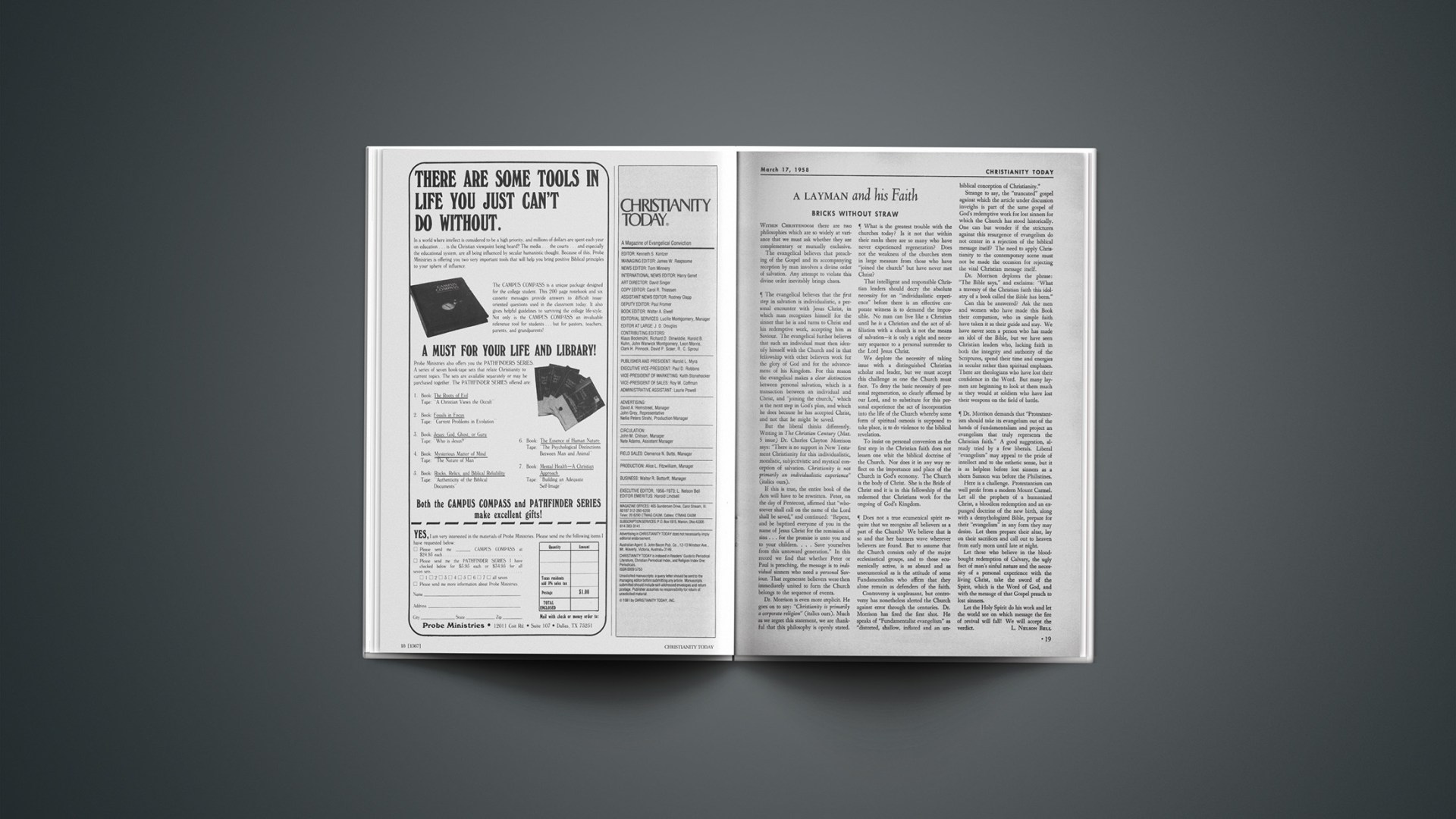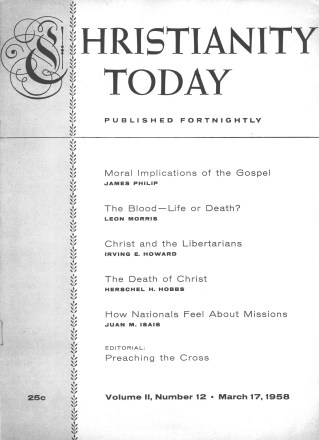Bricks Without Straw
Within Christendom there are two philosophies which are so widely at variance that we must ask whether they are complementary or mutually exclusive.
The evangelical believes that preaching of the Gospel and its accompanying reception by man involves a divine order of salvation. Any attempt to violate this divine order inevitably brings chaos.
The evangelical believes that the first step in salvation is individualistic, a personal encounter with Jesus Christ, in which man recognizes himself for the sinner that he is and turns to Christ and his redemptive work, accepting him as Saviour. The evangelical further believes that such an individual must then identify himself with the Church and in that fellowship with other believers work for the glory of God and for the advancement of his Kingdom. For this reason the evangelical makes a clear distinction between personal salvation, which is a transaction between an individual and Christ, and “joining the church,” which is the next step in God’s plan, and which he does because he has accepted Christ, and not that he might be saved.
But the liberal thinks differently. Writing in The Christian Century (Mar. 5 issue) Dr. Charles Clayton Morrison says: “There is no support in New Testament Christianity for this individualistic, moralistic, subjectivistic and mystical conception of salvation. Christianity is not primarily an individualistic experience” (italics ours).
If this is true, the entire book of the Acts will have to be rewritten. Peter, on the day of Pentecost, affirmed that “whosoever shall call on the name of the Lord shall be saved,” and continued: “Repent, and be baptized everyone of you in the name of Jesus Christ for the remission of sins … for the promise is unto you and to your children.… Save yourselves from this untoward generation.” In this record we find that whether Peter or Paul is preaching, the message is to individual sinners who need a personal Saviour. That regenerate believers were then immediately united to form the Church belongs to the sequence of events.
Dr. Morrison is even more explicit. He goes on to say: “Christianity is primarily a corporate religion” (italics ours). Much as we regret this statement, we are thankful that this philosophy is openly stated.
What is the greatest trouble with the churches today? Is it not that within their ranks there are so many who have never experienced regeneration? Does not the weakness of the churches stem in large measure from those who have “joined the church” but have never met Christ?
That intelligent and responsible Christian leaders should decry the absolute necessity for an “individualistic experience” before there is an effective corporate witness is to demand the impossible. No man can live like a Christian until he is a Christian and the act of affiliation with a church is not the means of salvation—it is only a right and necessary sequence to a personal surrender to the Lord Jesus Christ.
We deplore the necessity of taking issue with a distinguished Christian scholar and leader, but we must accept this challenge as one the Church must face. To deny the basic necessity of personal regeneration, so clearly affirmed by our Lord, and to substitute for this personal experience the act of incorporation into the life of the Church whereby some form of spiritual osmosis is supposed to take place, is to do violence to the biblical revelation.
To insist on personal conversion as the first step in the Christian faith does not lessen one whit the biblical doctrine of the Church. Nor does it in any way reflect on the importance and place of the Church in God’s economy. The Church is the body of Christ. She is the Bride of Christ and it is in this fellowship of the redeemed that Christians work for the ongoing of God’s Kingdom.
Does not a true ecumenical spirit require that we recognize all believers as a part of the Church? We believe that is so and that her banners wave wherever believers are found. But to assume that the Church consists only of the major ecclesiastical groups, and to those ecumenically active, is as absurd and as unecumenical as is the attitude of some Fundamentalists who affirm that they alone remain as defenders of the faith.
Controversy is unpleasant, but controversy has nonetheless alerted the Church against error through the centuries. Dr. Morrison has fired the first shot. He speaks of “Fundamentalist evangelism” as “distorted, shallow, inflated and an unbiblical conception of Christianity.”
Strange to say, the “truncated” gospel against which the article under discussion inveighs is part of the same gospel of God’s redemptive work for lost sinners for which the Church has stood historically. One can but wonder if the strictures against this resurgence of evangelism do not center in a rejection of the biblical message itself? The need to apply Christianity to the contemporary scene must not be made the occasion for rejecting the vital Christian message itself.
Dr. Morrison deplores the phrase: “The Bible says,” and exclaims: “What a travesty of the Christian faith this idolatry of a book called the Bible has been.”
Can this be answered? Ask the men and women who have made this Book their companion, who in simple faith have taken it as their guide and stay. We have never seen a person who has made an idol of the Bible, but we have seen Christian leaders who, lacking faith in both the integrity and authority of the Scriptures, spend their time and energies in secular rather than spiritual emphases. There are theologians who have lost their confidence in the Word. But many laymen are beginning to look at them much as they would at soldiers who have lost their weapons on the field of battle.
Dr. Morrison demands that “Protestantism should take its evangelism out of the hands of fundamentalism and project an evangelism that truly represents the Christian faith.” A good suggestion, already tried by a few liberals. Liberal “evangelism” may appeal to the pride of intellect and to the esthetic sense, but it is as helpless before lost sinners as a shorn Samson was before the Philistines.
Here is a challenge. Protestantism can well profit from a modern Mount Carmel. Let all the prophets of a humanized Christ, a bloodless redemption and an expunged doctrine of the new birth, along with a demythologized Bible, prepare for their “evangelism” in any form they may desire. Let them prepare their altar, lay on their sacrifices and call out to heaven from early mom until late at night.
Let those who believe in the blood-bought redemption of Calvary, the ugly fact of man’s sinful nature and the necessity of a personal experience with the living Christ, take the sword of the Spirit, which is the Word of God, and with the message of that Gospel preach to lost sinners.
Let the Holy Spirit do his work and let the world see on which message the fire of revival will fall! We will accept the verdict.
L. NELSON BELL









